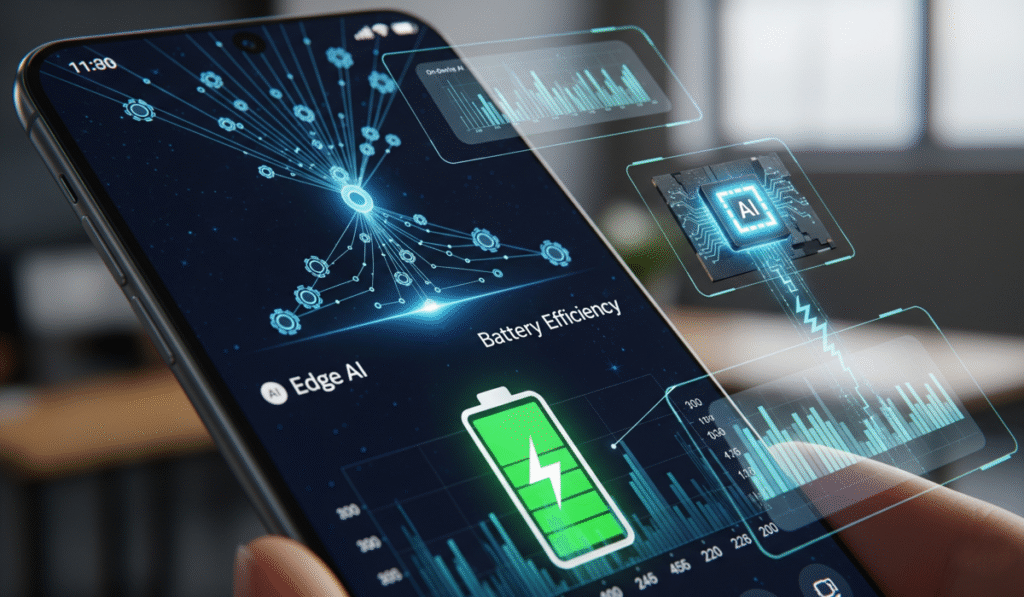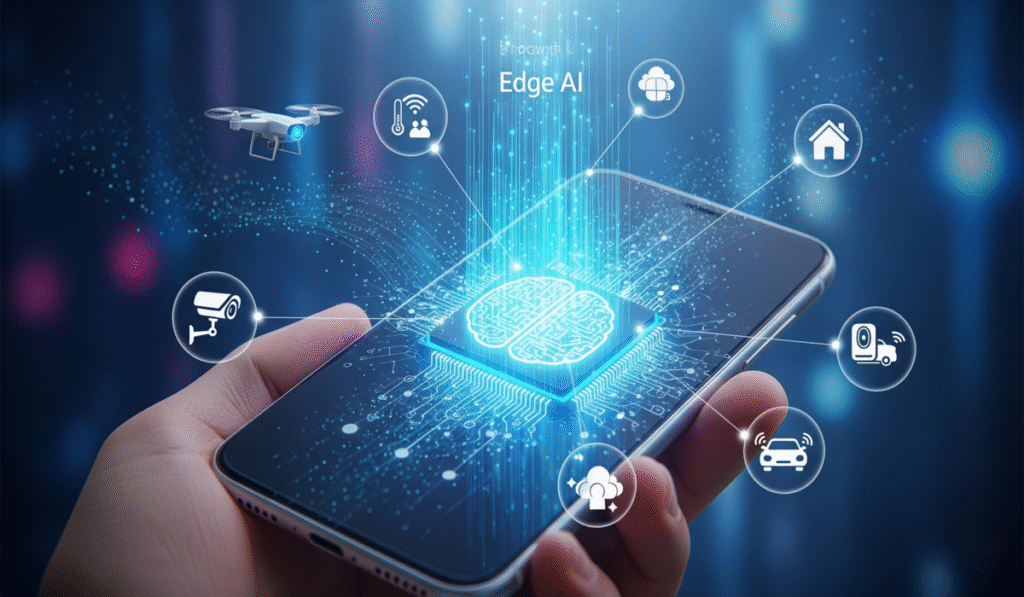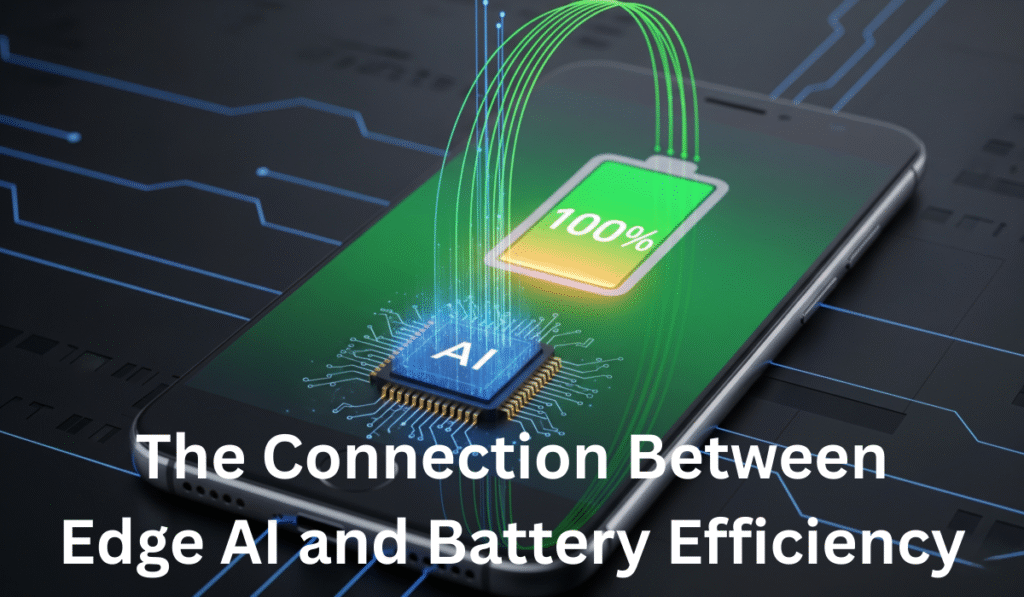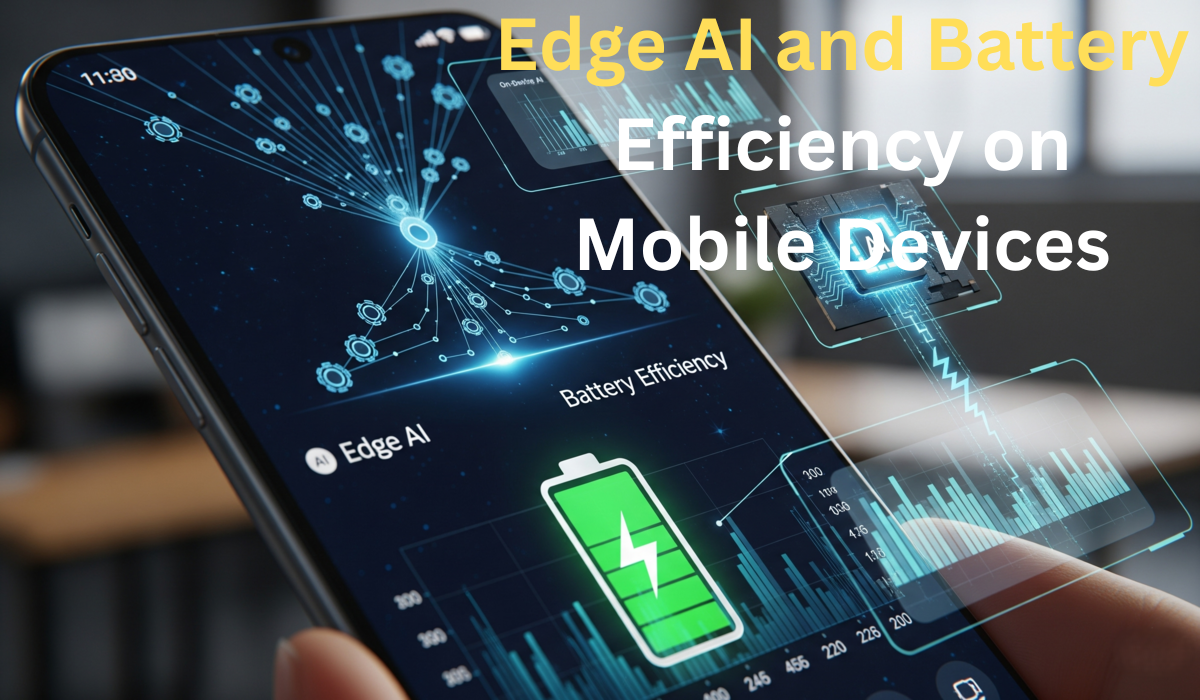Discover how Edge AI and Battery Efficiency on Mobile Devices are transforming modern technology. Learn benefits, challenges, use cases, and FAQs in this detailed guide.
Table of Contents
Introduction : Edge AI and Battery Efficiency on Mobile Devices

Technology is advancing at lightning velocity, and mobile gadgets are on the center of this revolution. From smartphones to wearables, each tool we use today is becoming smarter and more strength-efficient. One of the largest motives behind this progress is the rise of Edge AI and Battery Efficiency on Mobile Devices.
In this blog, we’ll explore what area AI is, why battery performance topics, how they may be connected, and what the destiny holds.
What is Edge AI?

Edge AI refers to the process where artificial intelligence computations happen directly on the device itself, rather than relying on cloud servers. For example:
- Voice assistants that respond without internet (offline mode).
- Cameras that process images instantly for better results.
- Smartwatches that analyze health data in real-time.
By moving intelligence from the cloud to the “edge” (the device), users experience faster performance, more privacy, and reduced energy consumption.
This concept plays a major role when we discuss Edge AI and Battery Efficiency on Mobile Devices.
Why Battery Efficiency Matters in Mobile Devices
No matter how advanced a device is, it’s only useful as long as its battery lasts. Today, users demand:
- Long-lasting smartphones
- Power-efficient wearables
- Laptops that run for hours without charging
Battery efficiency is not just about bigger batteries—it’s about optimizing power consumption. And this is where edge AI becomes a game-changer.
The Connection Between Edge AI and Battery Efficiency on Mobile Devices

Here’s how they complement each other:
- Reduced Cloud Dependency
- Sending data to the cloud consumes energy. Edge AI reduces this need, saving battery power.
- Real-Time Processing
- Faster on-device decision-making means less waiting, less power drain.
- Optimized Resource Usage
- AI learns user habits and adjusts performance to extend battery life.
- Lower Latency, Lower Power
- Reduced background tasks save both time and energy.
This is why experts believe that Edge AI and Battery Efficiency on Mobile Devices will define the future of consumer electronics.
Examples of Edge AI and Battery Efficiency on Mobile Devices
1. Smartphones
- Cameras with AI-powered filters optimize without draining battery.
- Voice assistants like Google Assistant Lite or Siri Shortcuts use edge AI for quick responses.
2. Wearables
- Smartwatches track health data without constantly syncing to the cloud.
- Fitness bands process data locally, saving both battery and bandwidth.
3. Laptops and Tablets
- AI-driven performance modes extend battery runtime.
- Real-time optimization of background apps reduces unnecessary consumption.
Benefits of Edge AI and Battery Efficiency on Mobile Devices
- Speed: No delays in data processing.
- Privacy: Data stays on the device, reducing risks.
- Battery Life: Less energy wasted on cloud operations.
- Offline Use: Devices still function without internet.
- User Experience: Smoother apps and longer usage.
By combining Edge AI and Battery Efficiency on Mobile Devices, brands deliver high performance without sacrificing battery health.
Challenges in Implementing Edge AI for Battery Efficiency
1. Hardware Limitations
- Small devices struggle with high AI workloads.
2. Heat Management
- More processing can generate more heat.
3. Software Optimization
- Developers must balance speed with energy savings.
4. Cost of Advanced Chips
- Efficient AI chips are expensive and increase device cost.
Despite challenges, the adoption of Edge AI and Battery Efficiency on Mobile Devices continues to grow rapidly.
Real-World Use Cases
1. Healthcare Wearables
- Real-time monitoring of heart rate, oxygen, and stress levels.
2. Smart Cameras
- Edge AI detects faces or intruders instantly without draining power.
3. Gaming Smartphones
- AI adjusts graphics automatically to extend playtime.
4. Autonomous Vehicles (mini-scale)
- In smart scooters or drones, edge AI optimizes battery routes.
All these examples show how Edge AI and Battery Efficiency on Mobile Devices are shaping modern industries.
The Future of Edge AI and Battery Efficiency on Mobile Devices
The future looks promising:
- 5G and Beyond: Faster networks will need more efficient on-device AI.
- AI-Optimized Batteries: Smart AI chips will extend charging cycles.
- IoT Expansion: Billions of devices will rely on efficient edge AI.
- Green Technology: Longer battery life means less e-waste.
Clearly, the partnership of Edge AI and Battery Efficiency on Mobile Devices is the foundation of the next generation of digital experiences.
Conclusion
Edge AI is revolutionizing how gadgets characteristic, while battery efficiency ensures they continue to be useful for longer. Together, Edge AI and Battery Efficiency on Mobile Devices are developing smarter, quicker, and extra reliable gadgets that meet person demands with out draining energy.
As generation evolves, every device—from your phone on your smartwatch—will rely on this effective aggregate.
FAQs
Q1. What is Edge AI in mobile devices?
Edge AI means running artificial intelligence directly on a device rather than depending on cloud servers.
Q2. How does Edge AI improve battery efficiency?
By reducing cloud communication and processing data locally, devices consume less energy.
Q3. Which devices use Edge AI for battery efficiency?
Smartphones, smartwatches, laptops, fitness bands, and even IoT gadgets.
Q4. What are the challenges of Edge AI?
Hardware limitations, heat issues, cost of AI chips, and software optimization.
Q5. What is the future of Edge AI and Battery Efficiency on Mobile Devices?
Smarter devices, longer battery lives, reduced cloud dependency, and more privacy for users.


1 thought on “Edge AI and Battery Efficiency on Mobile Devices”